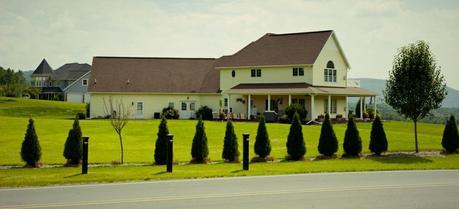 Houses neighboring shale gas pad, Pennsylvania (Credit: Flickr @ Jeremy Buckingham http://www.flickr.com/photos/62459458@N08/)
Houses neighboring shale gas pad, Pennsylvania (Credit: Flickr @ Jeremy Buckingham http://www.flickr.com/photos/62459458@N08/)
A report by experts at The University of Nottingham has shown that the British public is beginning to warm to the idea of shale gas. This doesn’t mean shale gas is a wildly popular alternative to other forms of energy but opinion appears to be shifting.
The research team, led by Professor Sarah O’Hara, School of Geography and Professor Mathew Humphrey, School of Politics and International Relations, carried out regular surveys over a 16 month period to look at people’s perceptions of shale gas.
Their results show that despite warnings about earthquakes, water contamination, and increasing carbon emissions, the UK public increasingly approve of the exploitation of shale gas as an energy source.
Professor O’Hara said: “The trends toward increasing approval of shale have been remarkably consistent, amongst a public that is also increasingly able to identify shale gas from an initial question about ‘fracking.’ The percentage of people able to identify shale gas from an opening question about hydraulic fracturing has risen from 37.6% in the initial poll carried out in March 2012 to 62.2% in the latest, July 2013 poll.” The number of people who associate shale gas with being a ‘cheap fuel’ has risen from 40.5% in the first survey to 55% now, and the positive rating for shale (the ‘do associate’ minus the ‘don’t associate’) is +33.4, up from +11.4 in the first survey, and steadily rose throughout the period.
Professor Humphrey said: “Shale gas may be seen as ‘cheap’, and therefore of appeal to people who see themselves as potential consumers, but do people believe it to be clean? Here the plurality is against shale, but again the trends are moving steadily in favor of shale gas.”
In the initial 2012 survey only 25.3% thought of this as a clean energy source, compared with 44.8% who did not make that association, giving a negative rating of −19.5. In the latest survey a third (33.5%) of people think of shale as clean, and 36.5% believe the opposite, leaving a negative rating of only −3.
Professor Humphrey said: “If we look at the expected impact of shale on greenhouse gas emissions we see similar trends. On this we should note that we have a very consistent plurality of ‘don’t knows’ of around 45-50%, but amongst those who do express a view as to whether shale is good or bad for the atmosphere we have gone from a negative rating of −0.4 in June 2012 (26.6%-27%) to a positive rating of 13.5 (32.8%-19.3%) in July 2013. On another ‘cleanliness’ issue, water contamination, we see negative ratings for shale but again the same trends. In March 2012, 44.5% of respondents associate shale with water contamination and only 23.9% did not. In July 2013 the respective figures were 35.2% and 29.8%. This gives a move in ratings (if we take water contamination to represent disapproval) from −20.6 to −5.4 in this period.
One association that is firmly planted in the public mind is between shale gas and “earthquakes”. The number of people making this association has remained high throughout.
The prospect of shale gas extraction in the UK is also increasingly approved by the British public. This does not, however, mean that shale gas has particularly high approval ratings when compared with other potential sources of energy.
Professor O’Hara said: “Overall we see very clear trends in this data, and the British public continue to warm to shale. However, this does not entail that shale gas is a wildly popular alternative to other forms of energy, although it remains to be seen whether that will change if the current movement in the climate of opinion continues.”

